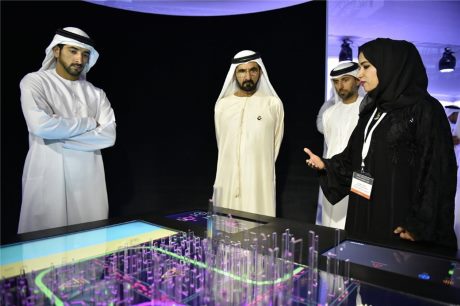The United Arab Emirates (UAE) has unveiled plans to increase the contribution of "clean energy" in its total energy mix to 50% by 2050. The UAE's new energy strategy sees half of the country's energy coming from renewables and nuclear, with the remaining half coming from fossil fuels.
 |
| Vice President Mohammed bin Rashid Al Maktoum (centre) at the event to launch the UAE's new strategy (Image: UAE Ministry of Energy) |
The strategy was unveiled on 10 January by the UAE's vice president, Sheikh Mohammed bin Rashid Al Maktoum, who is prime minister of Dubai. Sheikh Mohammed said the UAE aims to invest AED600 billion ($163 billion) by 2050 to meet growing demand and ensure the sustainable growth of its economy.
"Our new energy plan balances supply and demand, and takes into consideration our international commitments in terms of the environment. It also seeks to ensure a conducive economic environment for growth across sectors," he said. The strategy has been jointly developed by all energy-related authorities and executive councils in the UAE under the supervision of the federal government represented by the Ministry of Energy, and the Ministry of Cabinet Affairs and The Future.
"The new strategy takes into consideration an expected annual growth of 6%, and efforts to increase the contribution of clean energy in the energy mix from 25% to 50% by 2050, apart from the reduction of the carbon footprint resulting from power generation by 70% over the next three decades," Sheikh Mohammed said.
He said the plan was the UAE's first unified energy strategy based on supply and demand. "The Gulf countries are similar in their economic structure, and we hope that we will one day have a unified GCC [Gulf Cooperation Council] energy strategy in order to ensure sustainable growth for our people and global influence for our economies," he added.
The strategy is targeting a 2050 energy mix of 44% "clean energy", which would appear to mean renewables, 38% gas, 12% "clean coal" and 6% nuclear. The strategy also aims to change the energy consumption culture by slashing residential energy consumption by 40%.
Creating value
The UAE's Emirates Nuclear Energy Corporation (Enec) is currently building four Korean-designed nuclear units at Barakah, the first of which is expected to start up later this year. When complete, the power station is expected to deliver up to a quarter of the UAE's electricity.
Speaking at the Atlantic Council Global Energy Forum in Abu Dhabi yesterday, Enec CEO Mohammed Al Hammadi said the project, now 75% complete, was one of the biggest new nuclear build construction sites in the world.
"The development of peaceful nuclear energy in the UAE has already created solid value across many strategic sectors in the UAE and internationally," he said.
Researched and written
by World Nuclear News




_23009.jpg)
_33392.jpg)
_53504.jpg)







